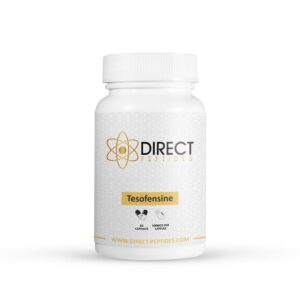Tesofensine has gained attention in weight loss research for its potential to help the body burn fat more effectively. Studies suggest that Tesofensine supports weight loss by suppressing appetite while also influencing fat metabolism, making it a compound of interest in obesity and metabolic research.
Preliminary research indicates that Tesofensine may reduce hunger signals and increase the body’s ability to burn stored fat. These combined effects could contribute to meaningful reductions in body weight and body fat. Researchers continue to examine its impact on energy balance and eating behavior to better understand its role in weight management studies.
Understanding the science behind Tesofensine is essential for evaluating its potential in weight loss research. Clinical trials have shown promising outcomes, particularly in body fat reduction. Ongoing studies focus on its mechanisms of action and how it interacts with neurotransmitters involved in appetite control and fat metabolism.
Explore Tesofensine from Direct Peptides , a research peptide that supports weight loss by enhancing fat burning and appetite control.
One of the main factors that make Tesofensine for weight loss effective is its ability to control appetite. Researchers have found that Tesofensine increases the levels of certain neurotransmitters in the brain, including serotonin, dopamine, and norepinephrine, which help regulate hunger.
By blocking the reuptake of these neurotransmitters, Tesofensine helps increase their presence in the brain, leading to reduced hunger.
This reduction in hunger is key to maintaining a caloric deficit, which is necessary for weight loss. Appetite control is crucial for those who struggle with overeating, as it enables individuals to stick to a reduced-calorie diet without the constant urge to eat. Tesofensine’s ability to curb cravings and suppress hunger makes it an effective tool for weight management in research studies.
Explore Peptide Supplies at Direct Peptides for all your reconstitution requirements.
 Managing appetite is often one of the hardest parts of trying to lose weight. The feeling of hunger and constant cravings can make it challenging to stick to a healthy diet. This is where Tesofensine for weight loss could play a key role.
Managing appetite is often one of the hardest parts of trying to lose weight. The feeling of hunger and constant cravings can make it challenging to stick to a healthy diet. This is where Tesofensine for weight loss could play a key role.
When Tesofensine suppresses appetite, it makes it easier for individuals to follow a lower-calorie diet without feeling deprived or constantly thinking about food. This leads to more consistent calorie reduction, which helps drive weight loss over time.
Many individuals struggle with emotional eating, where stress or boredom leads to eating more than necessary. By reducing the hunger signals in the brain, Tesofensine could help individuals avoid overeating, thus making it easier to stick to a calorie-restricted diet. This form of appetite control is critical for anyone trying to lose weight, especially in clinical studies focused on weight management.
Tesofensine supports fat burning by enhancing fat metabolism. Fat metabolism refers to the body’s ability to break down stored fat and convert it into usable energy. Tesofensine increases fat metabolism by promoting fat oxidation, a process in which the body relies on fat for fuel rather than carbohydrates.
In addition to improving fat metabolism, Tesofensine increases energy expenditure by stimulating thermogenesis. Thermogenesis occurs when the body produces heat and burns calories, even during periods of rest. By activating this process, Tesofensine raises the number of calories the body burns throughout the day.
By increasing both thermogenesis and fat oxidation, Tesofensine enables the body to burn more fat while simultaneously boosting total calorie expenditure. This dual action supports greater fat loss and contributes to more efficient weight reduction in research.
Together, these effects position Tesofensine as a valuable compound in weight loss research focused on accelerating fat loss and improving metabolic efficiency.
Fat metabolism and energy expenditure play a tightly linked role in successful weight loss. Fat metabolism describes how the body breaks down stored fat and uses it as a source of energy.
As fat burning increases, the body’s demand for energy also rises, which leads to greater overall energy expenditure. Tesofensine supports weight loss by enhancing both fat metabolism and energy output, making it a valuable option for managing body weight.
By improving fat metabolism, Tesofensine allows the body to rely more efficiently on fat as fuel. This process, known as fat oxidation, raises the total number of calories burned throughout the day.
In addition, Tesofensine promotes higher energy expenditure by activating thermogenesis, a mechanism in which the body produces heat and consumes more calories. Together, increased fat oxidation and elevated energy expenditure speed up fat loss, contributing to a more effective and sustained weight loss approach.
Another key reason Tesofensine increases energy expenditure lies in its ability to activate brown adipose tissue, commonly known as BAT. Unlike white adipose tissue, which primarily stores fat, BAT actively burns calories to produce heat.
Brown fat cells contain a high concentration of mitochondria, the structures responsible for energy production within cells. This allows BAT to convert fat into energy and generate heat through a process called non-shivering thermogenesis.
Tesofensine supports weight loss by stimulating BAT activity, which raises calorie burn even when the body is at rest. By activating brown adipose tissue, Tesofensine increases thermogenesis, leading to higher overall energy expenditure and enhanced fat loss. This mechanism makes BAT activation a crucial component of Tesofensine’s role in weight loss research, as it helps the body burn fat more efficiently.
While Tesofensine’s effects on brown adipose tissue play an important role in increasing calorie expenditure, researchers are also studying other peptides for their fat-burning capabilities. Exploring these additional peptides helps expand the broader understanding of weight loss strategies and metabolic support.
While Tesofensine for weight loss has shown great potential, it is not the only peptide being studied for its effects on fat loss.
Other peptides, including AOD-9604, Tesamorelin, and FTPP (Adipotide), are also being researched for their ability to promote fat burning and improve metabolism. These peptides work in different ways but share the common goal of supporting weight loss.
Let’s dive deeper into the details of these additional peptides and explore how they can complement Tesofensine in weight loss research.
 AOD-9604 is a peptide derived from human growth hormone (HGH). Unlike HGH, AOD-9604 does not stimulate growth but specifically targets fat metabolism.
AOD-9604 is a peptide derived from human growth hormone (HGH). Unlike HGH, AOD-9604 does not stimulate growth but specifically targets fat metabolism.
AOD-9604 helps break down fat and prevent the formation of new fat stores. Studies have shown that AOD-9604 can help reduce body fat, particularly around the abdominal area.
By promoting fat breakdown, AOD-9604 works well alongside Tesofensine to help reduce fat stores and improve body composition.
AOD-9604 has also been researched for its ability to help with visceral fat, the fat that surrounds internal organs.
Together with Tesofensine, it could be a powerful tool in weight loss research.
Discover AOD-9604 from Direct Peptides , a fat-burning peptide derived from human growth hormone, designed to help reduce body fat without affecting growth.
 Tesamorelin is another peptide that has shown promise in weight loss research. It works by stimulating the release of growth hormone from the pituitary gland.
Tesamorelin is another peptide that has shown promise in weight loss research. It works by stimulating the release of growth hormone from the pituitary gland.
Growth hormone plays a role in fat metabolism, and Tesamorelin has been shown to specifically reduce visceral fat (the fat around internal organs).
Tesamorelin is often used in research involving individuals with metabolic conditions that cause excessive abdominal fat. When combined with other peptides like Tesofensine, it can help enhance fat loss and improve overall body composition.
Explore Tesamorelin from Direct Peptides , a peptide that promotes fat loss, particularly targeting visceral fat, by stimulating growth hormone release.
 FTPP (Adipotide), also known as Adipotide, is a peptide designed to target fat cells. It works by disrupting the blood supply to fat tissue, which leads to the destruction of fat cells.
FTPP (Adipotide), also known as Adipotide, is a peptide designed to target fat cells. It works by disrupting the blood supply to fat tissue, which leads to the destruction of fat cells.
FTPP (Adipotide) has shown significant fat-reducing effects in animal studies, and researchers are excited about its potential for human weight loss applications.
When used alongside Tesofensine, AOD-9604, and Tesamorelin, FTPP (Adipotide) could offer a comprehensive approach to fat reduction by directly targeting fat tissue while also supporting metabolic and appetite-related processes.
Unlock the power of FTPP (Adipotide) from Direct Peptides , a peptide that targets fat cells by disrupting their blood supply, leading to effective fat reduction.
Tesofensine for weight loss is an exciting compound that holds great potential for future weight management strategies. Though still for research purposes only, Tesofensine has shown promise in helping individuals control appetite, improve fat metabolism, and enhance thermogenesis.
Alongside other peptides like AOD-9604, Tesamorelin, and FTPP (Adipotide), it may pave the way for more effective weight loss treatments.
As research continues, we can expect more discoveries about the safety, effectiveness, and long-term use of these peptides. The future of weight loss research is evolving, and Tesofensine and other peptides may play a crucial role in shaping those solutions.
[1] Astrup A, Madsbad S, Breum L, Jensen TJ, Kroustrup JP, Larsen TM. Effect of tesofensine on bodyweight loss, body composition, and quality of life in obese patients: a randomised, double-blind, placebo-controlled trial. Lancet. 2008 Nov 29;372(9653):1906-1913.
[2] Astrup A, Meier DH, Mikkelsen BO, Villumsen JS, Larsen TM. Weight loss produced by tesofensine in patients with Parkinson’s or Alzheimer’s disease. Obesity (Silver Spring). 2008 Jun;16(6):1363-9.
[3] Ng FM, Sun J, Sharma L, Libinaka R, Jiang WJ, Gianello R. Metabolic studies of a synthetic lipolytic domain (AOD9604) of human growth hormone. Horm Res. 2000;53(6):274-8.
[4] Adrian S, Scherzinger A, Sanyal A, Lake JE, Falutz J, Dubé MP, Stanley T, Grinspoon S, Mamputu JC, Marsolais C, Brown TT, Erlandson KM. The Growth Hormone Releasing Hormone Analogue, Tesamorelin, Decreases Muscle Fat and Increases Muscle Area in Adults with HIV. J Frailty Aging. 2019;8(3):154-159.
[5] Barnhart KF, Christianson DR, Hanley PW, Driessen WH, Bernacky BJ, Baze WB, Wen S, Tian M, Ma J, Kolonin MG, Saha PK, Do KA, Hulvat JF, Gelovani JG, Chan L, Arap W, Pasqualini R. A peptidomimetic targeting white fat causes weight loss and improved insulin resistance in obese monkeys. Sci Transl Med. 2011 Nov 9;3(108):108ra112.
[6] Gilbert JA, Gasteyger C, Raben A, Meier DH, Astrup A, Sjödin A. The effect of tesofensine on appetite sensations. Obesity (Silver Spring). 2012 Mar;20(3):553-61.
Discover ALL Capsules from Direct Peptides for research purposes online today.
Research suggests Tesofensine may begin influencing appetite-regulating neurotransmitters within days, helping reduce hunger and cravings. By blocking reuptake of serotonin, dopamine, and norepinephrine, it promotes prolonged satiety and easier calorie control. Although not approved for human use, clinical trials indicate its appetite-suppressing effects may contribute to meaningful fat loss in controlled weight-management studies.
Preliminary studies indicate Tesofensine may increase fat burning by enhancing thermogenesis and fat oxidation. These processes help the body shift from using carbohydrates to using stored fat as fuel. By stimulating metabolic activity and increasing energy expenditure, Tesofensine supports a more efficient fat-burning environment in research settings, making it a promising candidate for future weight-management studies.
Tesofensine may raise energy expenditure by stimulating thermogenesis and activating brown adipose tissue (BAT). BAT burns calories to generate heat, contributing to increased baseline energy output. When combined with enhanced fat oxidation, Tesofensine creates a metabolic environment that supports steady fat loss during caloric restriction—an effect observed in early weight-loss research trials.
Brown adipose tissue (BAT) is a metabolically active fat that burns calories to generate heat. Unlike white fat, BAT contains high mitochondria levels and supports non-shivering thermogenesis. Activating BAT increases daily energy expenditure, helping the body burn more fat even at rest. Research peptides like Tesofensine may stimulate BAT activity, contributing to improved fat metabolism in studies.

Tesofensine Capsules
£159.66 Select options This product has multiple variants. The options may be chosen on the product page
Tesamorelin Pre-Mixed Pen 2mg Peptide
£28.34 – £76.52Price range: £28.34 through £76.52 Select options This product has multiple variants. The options may be chosen on the product page
FTPP (Adipotide)
£20.17 – £73.15Price range: £20.17 through £73.15 Select options This product has multiple variants. The options may be chosen on the product page
New Reduced Price
New Reduced Price
AOD-9604 Nasal Spray
£26.33 – £47.66Price range: £26.33 through £47.66 Select options This product has multiple variants. The options may be chosen on the product pageALL CONTENT AND PRODUCT INFORMATION AVAILABLE ON THIS WEBSITE IS FOR EDUCATIONAL PURPOSES ONLY.
DISCLAIMER: These products are intended solely as a research chemical only. This classification allows for their use only for research development and laboratory studies. The information available on our Direct Peptides website: https://direct-peptides.com is provided for educational purposes only. These products are not for human or animal use or consumption in any manner. Handling of these products should be limited to suitably qualified professionals. They are not to be classified as a drug, food, cosmetic, or medicinal product and must not be mislabelled or used as such.